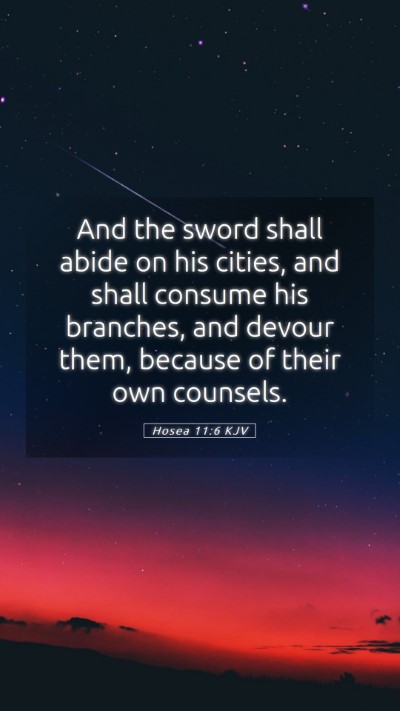Old Testament
Genesis Exodus Leviticus Numbers Deuteronomy Joshua Judges Ruth 1 Samuel 2 Samuel 1 Kings 2 Kings 1 Chronicles 2 Chronicles Ezra Nehemiah Esther Job Psalms Proverbs Ecclesiastes Song of Solomon Isaiah Jeremiah Lamentations Ezekiel Daniel Hosea Joel Amos Obadiah Jonah Micah Nahum Habakkuk Zephaniah Haggai Zechariah MalachiHosea 11:6 Meaning
What is the meaning of Hosea 11:6?
And the sword shall abide on his cities, and shall consume his branches, and devour them, because of their own counsels.
Hosea 11:6 Bible Verse Meaning
Bible Verse Commentary on Hosea 11:6
Understanding Hosea 11:6
Hosea 11:6 states: "And the sword shall abide on his cities, and shall consume his branches, and devour them, because of their own counsels." This verse delves into themes of divine judgment, human consequences, and the metaphorical representation of God’s relationship with Israel. To grasp this profound text, we can synthesize insights from public domain commentaries such as those by Matthew Henry, Albert Barnes, and Adam Clarke.
Summary of Insights
-
Divine Judgment:
Matthew Henry emphasizes that the "sword" signifies God's judgment coming upon the cities as a consequence of their unfaithfulness and transgressions. The imagery indicates impending destruction due to Israel's disobedience.
-
The Role of Counsel:
Albert Barnes points out that the phrase "because of their own counsels" highlights the self-destructive nature of Israel's decisions. Their reliance on human wisdom over divine guidance leads to their downfall, illustrating the importance of aligning with God's will.
-
Metaphorical Consumption:
Adam Clarke explains that the "branches" represent the people of Israel, and their consumption by the sword indicates the complete annihilation of their societal structures and influence due to their sinful choices.
Historical Context
This verse is set amid a tumultuous period in Israel's history, marked by frequent moral decline and political strife. The prophetic message delivered by Hosea is a call to reflection and repentance, urging Israel to return to God's ways before facing dire consequences.
Theological Themes
Hosea 11:6 raises significant theological themes relevant to Bible verse interpretations:
-
Human Responsibility:
It stresses the concept of human accountability in the face of divine authority. Individuals and nations must recognize the repercussions of their actions in relation to God’s commandments.
-
God's Justice:
The verse encapsulates the principle of divine justice, where God reacts to the moral choices of His people. It serves as a reminder of the serious consequences of straying from divine guidance.
Application to Daily Life
Understanding Scripture can often be augmented by applying its lessons to daily life. Hosea 11:6 encourages individuals to:
- Reflect on their choices and counsel to ensure they align with biblical principles.
- Recognize the importance of seeking divine guidance over relying solely on personal wisdom.
- Pursue righteousness and justice in personal and communal decisions to avoid adverse consequences.
Cross References
To further enrich the study of Hosea 11:6, consider related Bible passages:
- Isaiah 1:19-20: Highlights the consequences of obedience versus disobedience to God.
- Galatians 6:7: Discusses the principle of sowing and reaping, echoing the theme of consequences.
- Ezekiel 18:30: Invites reflection on turning from sin and returning to righteousness.
Conclusion
Bible Verse Commentary on Hosea 11:6 offers profound insights into the themes of divine judgment, human accountability, and the metaphorical implications of Israel’s relationship with God. With careful study, believers can gain a deeper understanding of the verse and its applicability to modern life.


